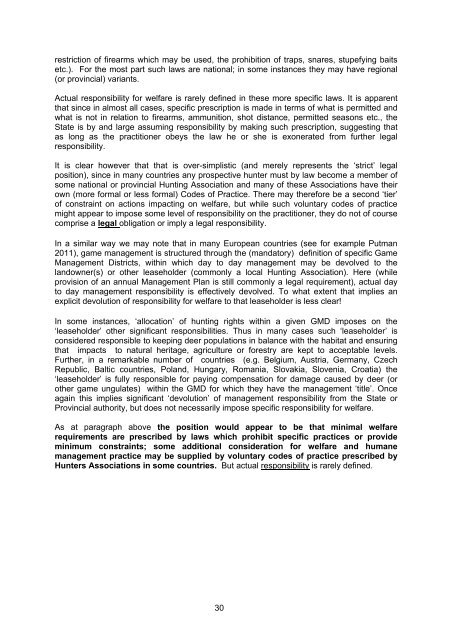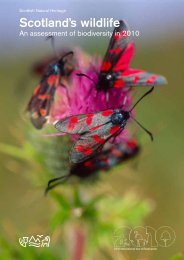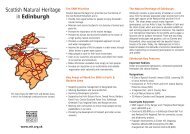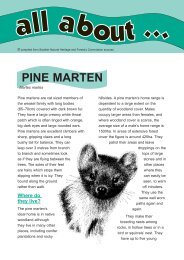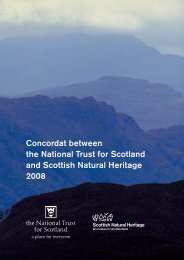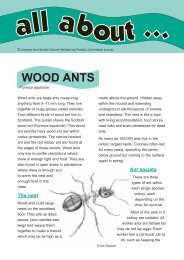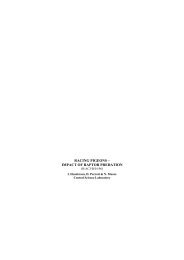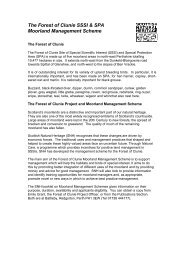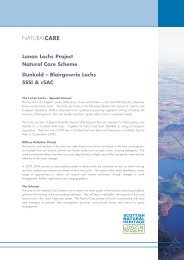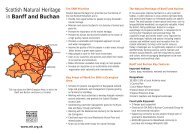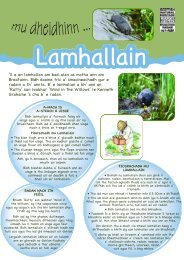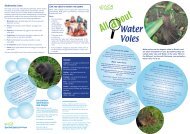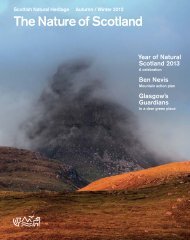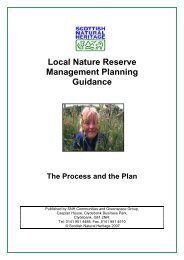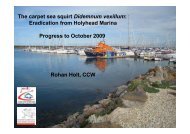Applying wildlife welfare principles to individual animals
Applying wildlife welfare principles to individual animals
Applying wildlife welfare principles to individual animals
You also want an ePaper? Increase the reach of your titles
YUMPU automatically turns print PDFs into web optimized ePapers that Google loves.
estriction of firearms which may be used, the prohibition of traps, snares, stupefying baits<br />
etc.). For the most part such laws are national; in some instances they may have regional<br />
(or provincial) variants.<br />
Actual responsibility for <strong>welfare</strong> is rarely defined in these more specific laws. It is apparent<br />
that since in almost all cases, specific prescription is made in terms of what is permitted and<br />
what is not in relation <strong>to</strong> firearms, ammunition, shot distance, permitted seasons etc., the<br />
State is by and large assuming responsibility by making such prescription, suggesting that<br />
as long as the practitioner obeys the law he or she is exonerated from further legal<br />
responsibility.<br />
It is clear however that that is over-simplistic (and merely represents the ‘strict’ legal<br />
position), since in many countries any prospective hunter must by law become a member of<br />
some national or provincial Hunting Association and many of these Associations have their<br />
own (more formal or less formal) Codes of Practice. There may therefore be a second ‘tier’<br />
of constraint on actions impacting on <strong>welfare</strong>, but while such voluntary codes of practice<br />
might appear <strong>to</strong> impose some level of responsibility on the practitioner, they do not of course<br />
comprise a legal obligation or imply a legal responsibility.<br />
In a similar way we may note that in many European countries (see for example Putman<br />
2011), game management is structured through the (manda<strong>to</strong>ry) definition of specific Game<br />
Management Districts, within which day <strong>to</strong> day management may be devolved <strong>to</strong> the<br />
landowner(s) or other leaseholder (commonly a local Hunting Association). Here (while<br />
provision of an annual Management Plan is still commonly a legal requirement), actual day<br />
<strong>to</strong> day management responsibility is effectively devolved. To what extent that implies an<br />
explicit devolution of responsibility for <strong>welfare</strong> <strong>to</strong> that leaseholder is less clear!<br />
In some instances, ‘allocation’ of hunting rights within a given GMD imposes on the<br />
‘leaseholder’ other significant responsibilities. Thus in many cases such ‘leaseholder’ is<br />
considered responsible <strong>to</strong> keeping deer populations in balance with the habitat and ensuring<br />
that impacts <strong>to</strong> natural heritage, agriculture or forestry are kept <strong>to</strong> acceptable levels.<br />
Further, in a remarkable number of countries (e.g. Belgium, Austria, Germany, Czech<br />
Republic, Baltic countries, Poland, Hungary, Romania, Slovakia, Slovenia, Croatia) the<br />
‘leaseholder’ is fully responsible for paying compensation for damage caused by deer (or<br />
other game ungulates) within the GMD for which they have the management ‘title’. Once<br />
again this implies significant ‘devolution’ of management responsibility from the State or<br />
Provincial authority, but does not necessarily impose specific responsibility for <strong>welfare</strong>.<br />
As at paragraph above the position would appear <strong>to</strong> be that minimal <strong>welfare</strong><br />
requirements are prescribed by laws which prohibit specific practices or provide<br />
minimum constraints; some additional consideration for <strong>welfare</strong> and humane<br />
management practice may be supplied by voluntary codes of practice prescribed by<br />
Hunters Associations in some countries. But actual responsibility is rarely defined.<br />
30


